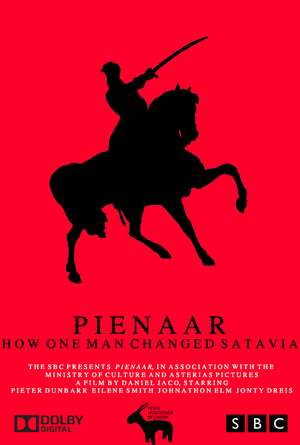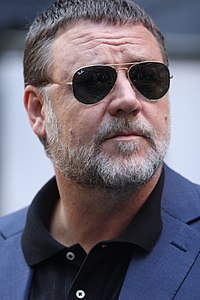Pienaar: Difference between revisions
m (Highest -> Second Highest) |
No edit summary |
||
| Line 128: | Line 128: | ||
[[Category:Satavia]] | [[Category:Satavia]] | ||
[[Category:Montecara Film Festival]] | [[Category:Montecara Film Festival]] | ||
[[Category:Films]] | |||
Revision as of 16:54, 31 March 2021
| Pienaar | |
|---|---|
 Theatrical release poster | |
| Directed by | Daniël Jaco |
| Written by | Matthew Limerick |
| Produced by | John Nickleback Arthur Dreis Edward Donaldson |
| Starring | Pieter Dunbarr Eilene Smith Johnathon Elm Jonty Dreis |
| Cinematography | Ruan de Villiers-Breybach |
| Edited by | John Macklroy |
| Music by | Hans Müller |
Production companies | |
| Distributed by | SBC |
Release dates |
|
Running time | 127 minutes |
| Country | Satavia |
| Language | Estmerish |
| Budget | €35-39 Million |
| Box office | €209.3 Million |
Pienaar is a 2021 Satavian epic historical war film directed by Daniël Jaco and produced by John Nickleback, Arthur Dreis and Edward Donaldson. The film stars Pieter Dunbarr, Eilene Smith, Jonathon Elm and Jonty Dreis.
The film tells the story of the mid-18th century Satavian revolutionary Adriaan Pienaar, who lead an uprising against Estmerish rule in Satavia in late 1771.
Produced by the Satavian Broadcasting Corporation and Nuvanian-owned AsteriasPictures, the film premiered on 20 June in Hondeberg, in the Central Territory - Pienaar's home town - and was released worldwide on the 23 June. The film was an instant success across both Asteria Inferior and Asteria Superior, and saw minor success in Euclea, grossing over €209 million, against a budget of €35 million (making it the second highest-grossing Satavian film of all time). The film also received universal acclaim for its acting and screenplay.
In addition to its critical and commercial success, the film was nominated for multiple awards including the Béco aùreo at the Montecara Film Festival, and won the Best Picture, Best Actor (Pieter Dunbarr), Best Supporting Actor (Jonty Dreis) and Best Cinematography at the Satavian Choice Award.
Plot
In 1747, the Kingdom of Estmere takes control of the Flamian colonies in Satavia, and a young Adriaan Pienaar (Donald Maxwell-Scott) watches as his father is hung by a group of Estmerish soldiers, and his mother is taken away to an unknown fate. Young Pienaar - only 12 - is taken into care with his aunt and uncle.
Time moves forward to 1771, and Ruan Swart (Jonathon Elm) is tending to his vineyard when Estmerish magistrate John Digolds (Alexander Borrcumb) tells Swart that he is to free his slaves; Swart refuses, and tells Digolds to leave. Swart warns Digolds again; and when Digolds does not comply, Swart kills him.
Hearing of the death of the magistrate, Lt. Col. James Mallory (Edwin Golds) sets off with a group of riders to arrest Swart - however, upon entering onto the farm, are ambushed by the waiting farmers, lead by Swart and Christian Matthys (Jonty Dreis).
Adriaan Pienaar (Pieter Dunbarr) is with his lover, the elusive Mrs Rose (Eilene Smith) when Matthys comes to find him - Matthys tells Pienaar that he is the only man that can unite the colonists to revolt against the Estmerish - Pienaar at first is reluctant, and refuses, but is later reminded of his parents by Mrs Rose, and travels on horseback to the revolter's camp to join them.
Arthur Malley (Edouard Florence), the tyrannical Governor of the Hope Province, shoots an official in the leg in a rage at the news of the unfolding situation on the fringes of the colony. He orders General Jan de Beers (James Schneider) to take control of the situation and to use "any means necessary" to crush the rebellion.
Pienaar reads the Hondeberg Declaration in his home town of Hondeberg where they hang the local magistrate and judge, in addition to a group of soldiers from the Estmerish garrison. Pienaar, Matthys and Swart prepare and train an army in preparation for a guerrilla war against the Estmerish.
Sir James de Lions (Charles Peter), Governor of the East River Colony, offers assistance to Malley; who accepts, and forces from the two colonies join up near Perdberg. Troops from Nuvania are later seen arriving.
On the morning of the 22 December, Willem van Breybach (Frederick Coles) and de Beer's men clash with those of Pienaar, Matthys and Swart's at the Battle of Hondeberg. Estmerish forces outnumber and outgun Pienaar's men, and they are soon forced to retreat. Matthys, whilst leading his forces through Arnett Woods, is knocked off his horse. He is strung up by the Estmerish soldiers, and attached to a bolting horse; he is then beaten and hanged from a tree.
Meanwhile, Pienaar's forces are in disarray and rapidly melting away. Pienaar meets with Swart as they attempt to re-organize their forces, to no avail. A group of Pienaar's soldiers are captured by Estmerish forces in the village of Dandredorp - the soldiers are tortured and then murdered.
Estmerish General Gerald E. Howe (Johan van Voordestads) launches a major attack on Pienaar's remaining forces, and Swart is captured during a skirmish with Colonel Jack Smits (Eric Mourdrey) 7th Battalion.
Pienaar is captured and sentenced to death; but as he is being lead to the gallows, the crowd threaten to riot and begin throwing vegetables at the Estmerish soldiers standing guard. Pienaar is saved from execution, and lead away back to the prison, whilst Mrs Rose watches on.
Cast
- Jonathon Elm as Ruan Swart
- Alexander Broccumb as John Digolds
- Edwin Golds as Lt. Col. James Mallory
- Jonty Dreis as Christian Matthys
- Pieter Dubarr as Adriaan Pienaar
- Donald Maxwell-Scott as Young Pienaar
- Eilene Smith as Mrs Rose
- Edouard Florence as Arthur Malley
- James Schneider as Jan de Beers
- Charles Peter as Sir James de Lions
- Frederick Coles as Willem van Breybach
- Johan van Voordestads as Gerald E. Howe
- Eric Mourdrey as Colonel Jack Smits
Production
Pienaar was filmed entirely in Satavia; most of the film was shot in Ballyleigh, near Port Elliot and Emerson, despite being set in the east of the country, mainly near the town of Hondeberg. Scenes showing Port Hope Fortress were filmed in Castlefergus, near Warmwater. Other scenes were shot on the Victoriaburg Peninsula, including the Battle of Hondeberg, whilst the "Death of Matthys" scene was the only scene not to be shot in Ballyleigh; instead shot in Arnett Woods themselves, in the Central Territory.
The film was produced by the Satavian Broadcasting Corporation in association with AsteriasPictures, and was awarded funds from the Ministry of Culture. The film was distributed by the SBC.
Reception
Pienaar premiered at the Hondeberg Film Festival on 20 June 2021, and was released worldwide three days later, on 23 June.
Box office
On its opening weekend, Pienaar grossed €7,333,912 in Satavia, and €150.5 million at the end of its box office run in Asteria Inferior. Worldwide, the film grossed €207.8 million and was the ninth highest-grossing film of 2021, in addition to becoming the second highest-grossing Satavian film both in Satavia and worldwide, behind Jaco's 1999 blockbuster Back to Me.
Critical response
Pienaar received generally positive reviews, with critics praising Pieter Dunbarr's performance as Adriaan Pienaar, and Jonty Dreis's role as Christian Matthys, as well as the direction and cinematography of the film. The film's soundtrack, composed by famous Weranian composer Hans Müller, was also widely praised and was nominated for Best Original Score at the Asterian Film Awards. On Mouldy Potatoes, the film has an approval rating of 89%, with an average score of 8.6/10, based on 73 reviews. On Betacritic, the film has a score of 81 out of 100, based on 28 reviews.
Writing for The Hope Post, Russel Douglas praised the film, calling it "one of the best films I have ever seen". Nuvanian critic Anze de Voorhelm said that "Pienaar makes up for its historical inaccuracy by thrilling us with its slightly disturbing and gritty fight scenes".
The film received a few negative reviews, mainly due to its historical inaccuracies, with many events glossed over, in the wrong order or being entirely fictional. The film caused controversy in Estmere because of its portrayal of the Estmerish as "tyrants".
Criticism
The film was criticised for its many historical inaccuracies, particularly for its portrayal of Estmerish colonial authorities as tyrants. The film was described by The Satavian as "... a version of the truth" and "one-sided". In one ahistorical scene, a group of Estmerish soldiers torture and then murder a group of Pienaar's soldiers - no such recorded incidents occurred during the revolt.
The Battle of Hondeberg is portrayed as a massacre of Pienaar's forces; in reality, the battle was relatively inconclusive. The scene was not filmed in Hondeberg; it was filmed near Victoriaburg, located on the other side of Satavia, and consequently "looked nothing like the actual battle". In addition, the scene was criticised for being almost completely fictional: whole regiments and commanders who were either not present at the battle or, in one case, did not exist, were created for dramatic effect.
The film was also accused of "Estmerophobia" by several Estmerish newspapers, with Barclay Gavinson writing in The Standard that "Pienaar is Estmerophobia at its best". Director Daniël Jaco dismissed these claims in an interview with SBC3 stating that "we were just using dramatic license, calm down!".
Awards
Won
At the Asterian Film Awards
- Best Actor in a Supporting Role (Jonty Dreis)
- Best Cinematography
At the Satavian Choice Award
- Best Actor (Pieter Dunbarr)
- Best Cinematography
- Best Picture
- Best Supporting Actor (Jonty Dreis)
Nominated
At the Asterian Film Awards
- Best Actor (Pieter Dunbarr)
- Best Original Score (Hans Müller)
- Best Picture
At the Montecara Film Festival
At the Satavian Choice Award
